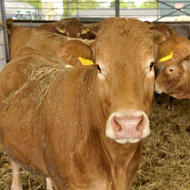
Detects levels of mycobacteria in blood
Researchers at the University of Nottingham have developed a new blood test for the detection of bovine TB (bTB).
The test detects low levels of the bacterium mycobacteria (M. bovis) in the blood, which is know to cause bTB.
Study authors say that the new method is simple, cheap and delivers results within 48 hours using a bacteriophage-based technique.
The team are now working to develop the test and have patented an improved version of the method that delivers results in just six hours.
Study author Dr. Cath Rees said: “The data we are getting has taken the scientific community by surprise. In our paper we show that when blood samples from skin test negative cattle were tested for M. bovis cells, all the samples proved negative. However using just a 2ml blood sample, viable Mycobacterium tuberculosis complex bacteria (MTC) were detected in 66 per cent of samples from skin test positive animals.
“When the carcasses were inspected, it was found that the highest number of bacteria were detected in the animals with visible TB lesions (VL) and 85 per cent of these VL animals were M. bovis positive.
“More excitingly, using our new more sensitive six-hour method, this figure is even higher - all animals with visible lesions were MTC positive, and even 26 out of 28 animals where the lesions were not yet visible also were positive suggesting that M. bovis is commonly found in the circulating blood of infected animals.”
Dr Rees and her team are hopeful that their method will also help to uncover new and improved tests for other farm animals.
“We are directly detecting the bacteria and so the method will work using blood samples from any animal species – so far we have detected mycobacteria in the blood of cattle, sheep and horses, but it could also be used for deer, goats or llamas,” she said.
“Not only that, we can detect any type of mycobacteria, we have use the same method to detect other diseases, such as Johne’s disease, not just bTB.”
The research: ‘Evidence of Mycobacterium tuberculosis complex bacteraemia in intradermal skin test positive cattle detected using phage-RPA' has been published online in the peer reviewed medical journal Virulence.



 The Federation of Independent Veterinary Practices (FIVP) has announced a third season of its podcast, Practice Matters.
The Federation of Independent Veterinary Practices (FIVP) has announced a third season of its podcast, Practice Matters.